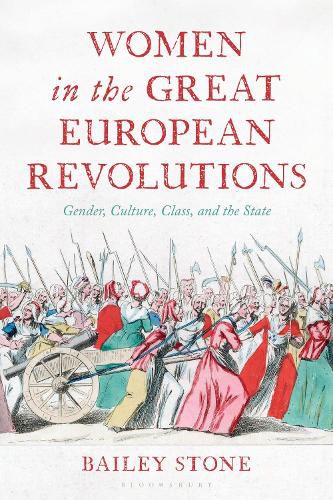Readings Newsletter
Become a Readings Member to make your shopping experience even easier.
Sign in or sign up for free!
You’re not far away from qualifying for FREE standard shipping within Australia
You’ve qualified for FREE standard shipping within Australia
The cart is loading…






This book explores and compares the roles, mentalities, and destinies of elitist and working-class women in Europe's most dramatic revolutions: England's "Puritan Revolution" of 1640-1660, France's 1789 Revolution, and Russia's 1917 Revolution.
By providing one of the most detailed analyses to date of how feminist historians, sociologists, and specialists theorize gender, sexuality, and patriarchy the author draws connections to current debate over the causation of sociopolitical revolutions; and how such scholars speculate about the long-term implications of such revolutions for women in the USA and in other countries. This book briefly outlines the stage-by-stage progression of events in the English, French, and Russian Revolutions, thus enabling the general reader to contextualize more easily its discussion of women's revolutionary experiences in those countries. This book reappraises the relative importance ascribable to gendered/cultural and to statist/geopolitical factors through the disastrous revolutionary careers of three consort queens: i.e., Henrietta Maria of England, Marie-Antoinette of France, and Alexandra Feodorovna of Russia. by contrasting their political failings with the political acumen of three earlier regnant queens in these three countries: i.e., Elizabeth I, Catherine de Medicis, and Catherine II ("the Great.") Finally, this book demonstrates how women of humble social station used these unheard-of revolutionary situations either to express their grievances and voice their social aspirations or, on the other hand, to reaffirm their long-held allegiance to traditional principles, customs, and religion. It concludes by discussing race/ethnicity and statism as challenging issues that need to be confronted in any current discussion of women's revolutionary experiences.
$9.00 standard shipping within Australia
FREE standard shipping within Australia for orders over $100.00
Express & International shipping calculated at checkout
This book explores and compares the roles, mentalities, and destinies of elitist and working-class women in Europe's most dramatic revolutions: England's "Puritan Revolution" of 1640-1660, France's 1789 Revolution, and Russia's 1917 Revolution.
By providing one of the most detailed analyses to date of how feminist historians, sociologists, and specialists theorize gender, sexuality, and patriarchy the author draws connections to current debate over the causation of sociopolitical revolutions; and how such scholars speculate about the long-term implications of such revolutions for women in the USA and in other countries. This book briefly outlines the stage-by-stage progression of events in the English, French, and Russian Revolutions, thus enabling the general reader to contextualize more easily its discussion of women's revolutionary experiences in those countries. This book reappraises the relative importance ascribable to gendered/cultural and to statist/geopolitical factors through the disastrous revolutionary careers of three consort queens: i.e., Henrietta Maria of England, Marie-Antoinette of France, and Alexandra Feodorovna of Russia. by contrasting their political failings with the political acumen of three earlier regnant queens in these three countries: i.e., Elizabeth I, Catherine de Medicis, and Catherine II ("the Great.") Finally, this book demonstrates how women of humble social station used these unheard-of revolutionary situations either to express their grievances and voice their social aspirations or, on the other hand, to reaffirm their long-held allegiance to traditional principles, customs, and religion. It concludes by discussing race/ethnicity and statism as challenging issues that need to be confronted in any current discussion of women's revolutionary experiences.